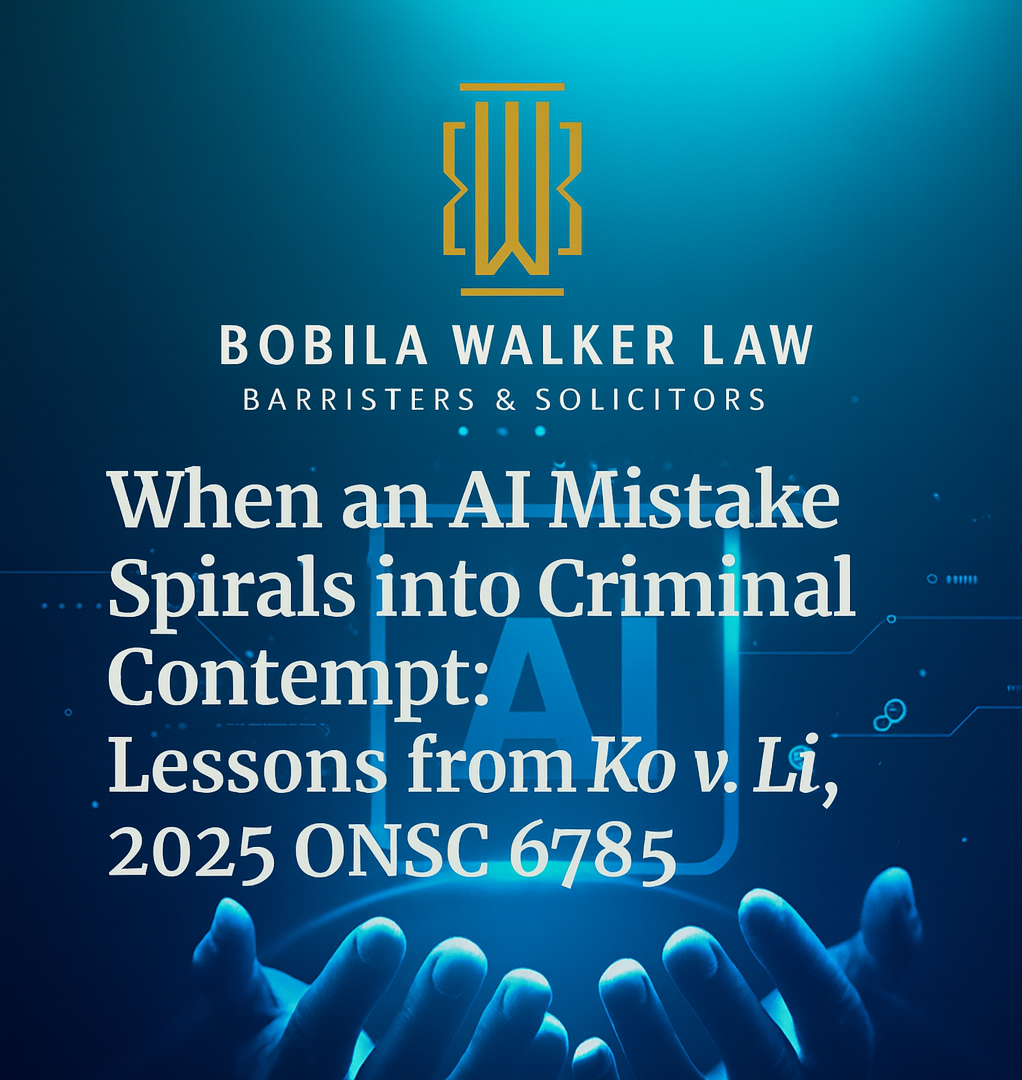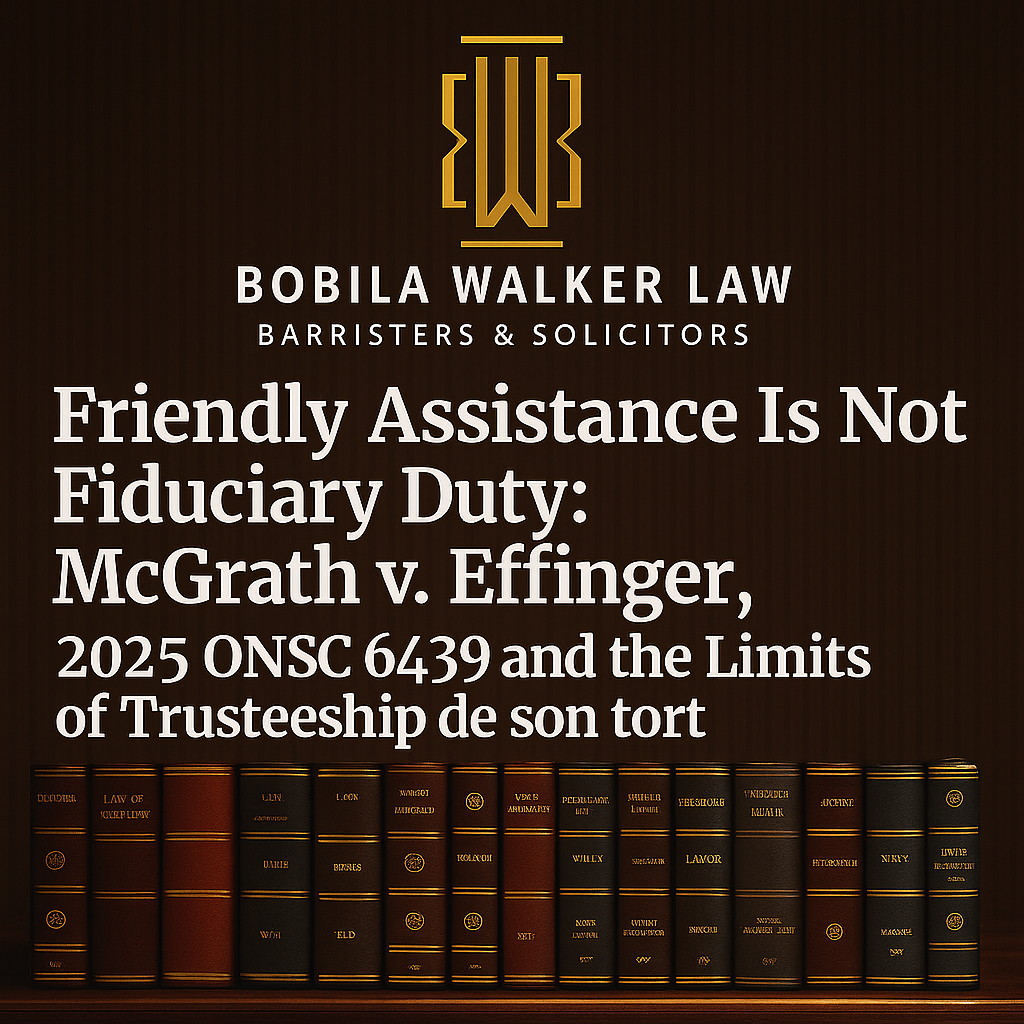The recent Ontario Court of Appeal decision in Muscat v. Muscat Estate, 2025 ONCA 518 (CanLII), serves as a powerful reminder of the critical responsibilities estate trustees hold and the consequences of failing to uphold them. This case underscores the importance of transparency, due diligence, and prioritizing the beneficiary’s interests in estate administration. Here’s what you need to know.
Case Overview
In Muscat v. Muscat Estate, the Ontario Court of Appeal upheld the removal of two estate trustees, Ilinka Armstrong and Dean Tully, for breaching their fiduciary duties to the estate of Dan Muscat. The sole beneficiary, Alexander Muscat, was a minor entitled to the estate’s residue, held in trust until age 25. The estate’s primary asset was a jewelry business and its building, valued at approximately $515,000 for probate purposes.
The conflict arose when Ms. Armstrong’s romantic partner, Steve Malizia, offered to buy the business for $400,000—a price significantly below its estimated value. Despite concerns raised by Alexander’s counsel about Ms. Armstrong’s conflict of interest, the trustees refused to acknowledge it, with their counsel dismissing the relationship as “irrelevant.” They recommended accepting the offer as the “best available option” without conducting due diligence or exploring alternatives, even pressuring Alexander to decide within a tight 10-day deadline.
Alexander sought the trustees’ removal, and the Superior Court agreed, citing their failure to manage the estate in his best interests. The Court of Appeal dismissed the trustees’ appeal, affirming their removal and ordering them to personally pay Alexander’s legal costs of $56,693.01 (trial) and $22,703.44 (appeal).
Key Legal Takeaways
This case highlights several critical principles for estate trustees and beneficiaries:
Fiduciary Duty is Non-Negotiable
Estate trustees are bound by a duty of loyalty to act honestly, with integrity, and in the best interests of the beneficiaries. The Court of Appeal emphasized that trustees cannot evade this responsibility by claiming a beneficiary was aware of a conflict or by delegating decisions without proper investigation. In this case, the trustees’ failure to assess the fairness of Mr. Malizia’s offer or seek alternative valuations breached their duty.Conflicts of Interest Must Be Disclosed and Addressed
Ms. Armstrong’s romantic relationship with the prospective buyer created a clear conflict of interest, as she stood to benefit from the sale. Her refusal to acknowledge or resolve this conflict, despite requests to resign, justified her removal. The court clarified that a beneficiary’s prior knowledge of a conflict does not absolve a trustee from disclosing it or taking corrective action.Due Diligence is Essential
The trustees’ recommendation to accept a below-market offer without investigating its reasonableness or exploring other options was a significant breach. Trustees must actively manage estate assets, ensuring decisions maximize value for the beneficiary, not merely pass offers along for approval.Personal Liability for Costs
The court ordered the trustees to personally pay Alexander’s legal costs due to their unreasonable conduct and refusal to resign. This aligns with the modern approach in estate litigation, which seeks to protect estate assets from depletion due to unnecessary disputes (Salter v. Salter Estate, 2009 CanLII 28403).
Why This Matters for You
For estate trustees, this case is a stark reminder of the high standard of care required. Failing to disclose conflicts, neglecting due diligence, or prioritizing personal interests over the beneficiary’s can lead to removal and financial consequences. Trustees must act transparently, seek professional valuations, and explore all options to ensure the estate’s assets are managed responsibly.
For beneficiaries, Muscat v. Muscat Estate demonstrates the importance of holding trustees accountable. If you suspect a trustee is acting improperly—whether due to conflicts, mismanagement, or lack of transparency—legal action may be necessary to protect your interests. Consulting an experienced estate lawyer can help you navigate these challenges effectively.
How Bobila Walker Law Can Help
At Bobila Walker Law, we specialize in estate administration and litigation. Whether you’re an estate trustee seeking guidance to fulfill your duties or a beneficiary concerned about mismanagement, our team is here to provide clear, practical solutions. We can assist with:
Advising trustees on their fiduciary obligations to avoid costly mistakes.
Representing beneficiaries in disputes over estate administration, including trustee removal applications.
Mediating estate conflicts to preserve relationships and minimize costs.
The Muscat v. Muscat Estate decision reinforces the need for vigilance and professionalism in estate administration. Don’t let conflicts or oversights jeopardize your inheritance.
Contact Us Today
If you’re navigating an estate matter or have questions about your rights as a trustee or beneficiary, Bobila Walker Law is here to help. Contact us at 416-847-1859 to schedule a consultation. Let us guide you through the complexities of estate law with confidence and care.
Stay informed, stay protected, and let Bobila Walker Law be your trusted partner in estate matters.





